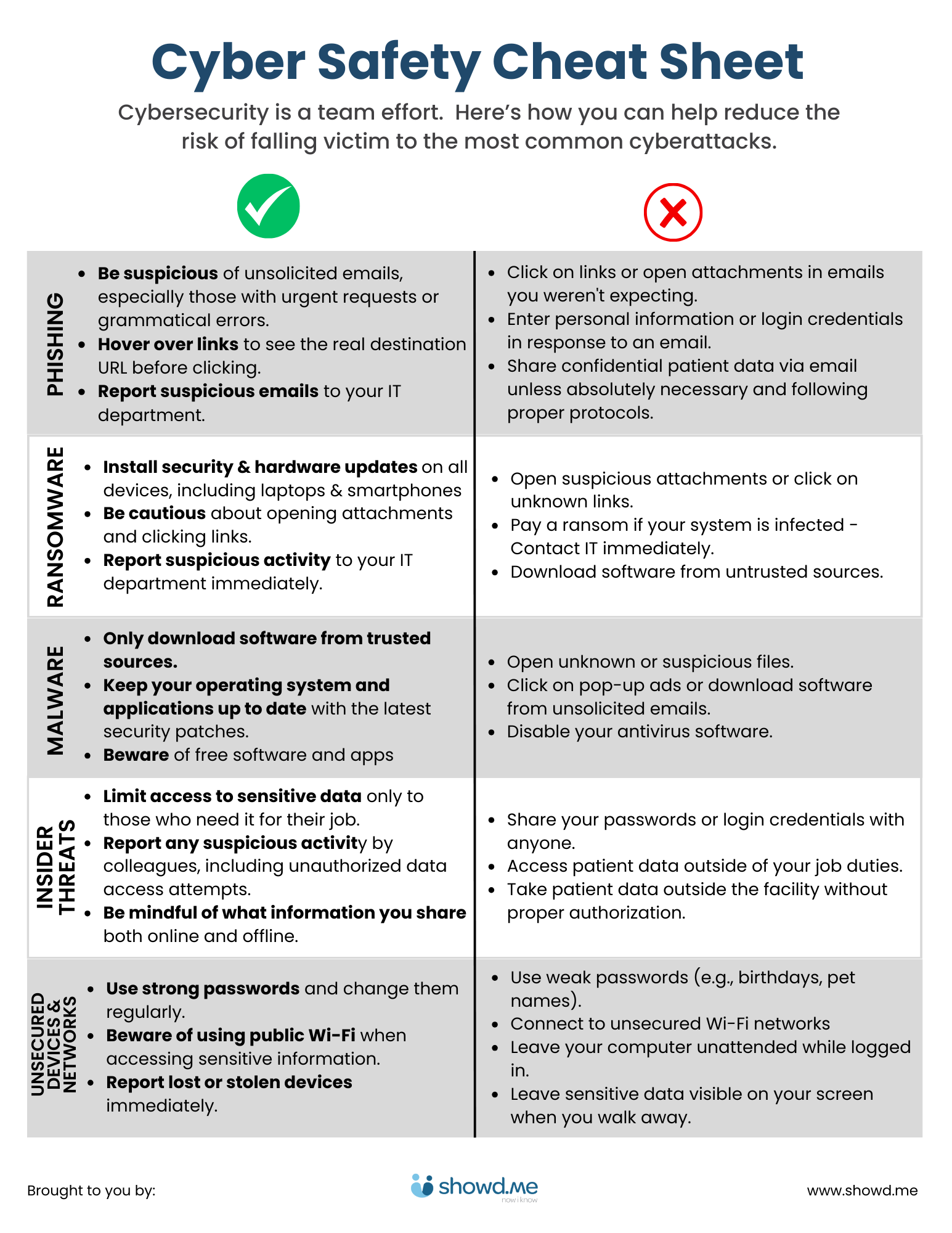Going Beyond HIPAA Training To Protect Patient Data
Post - Going Beyond HIPAA Training To Protect Patient Data
Audio: Going Beyond HIPAA Training To Protect Critical Patient Data
Social security numbers, medical history, names, phone numbers, addresses, insurance information—the healthcare industry is ripe with data. It’s no wonder that 78% of organizations have experienced at least one cybersecurity threat in the past 12 months and that the number of data breaches in healthcare has doubled in the past five years.
From social engineering and phishing to malware and ransomware, protecting patient and resident data in post-acute care is a continuous challenge for providers. And as a result, it’s no longer enough to just rely on HIPAA training to protect your organization.
HIPAA Compliance 101
The Health Insurance Portability and Accountability Act (HIPAA) establishes a federal standard for safeguarding patients' protected health information (PHI). This includes everything from medical records to conversations about a patient's health. HIPAA compliance ensures patients have control over their information and empowers them to make informed decisions about their care.
Violations of HIPAA can result in significant fines for healthcare organizations, with the average cost of a data breach reaching a staggering $10.93 million in 2023 according to IBM Security. These breaches not only carry a hefty financial penalty but also erode patient trust and damage an organization's reputation.
To achieve HIPAA compliance, healthcare organizations must implement various security measures. These include conducting risk assessments, implementing privacy and security policies, providing employee training, and implementing physical, technical, and administrative safeguards.
While HIPAA provides a strong foundation for safeguarding patient data, healthcare organizations must also focus on holistic cybersecurity training to enhance protection against evolving threats. This includes educating caregivers and staff about the importance of cybersecurity, common cyber threats, and best practices for protecting patient information.
Challenges in Healthcare Cybersecurity
Healthcare organizations face numerous challenges when it comes to cybersecurity, including:
- Increasingly sophisticated cyber threats: Cybercriminals are constantly evolving their tactics to target healthcare organizations. They use various methods such as phishing attacks, ransomware, and malware to gain unauthorized access to patient information.
- Insider threats: While external threats pose a significant risk, insider threats are also a concern. Employees or contractors with access to patient information may intentionally or unintentionally compromise data security.
- Legacy systems and outdated infrastructure: Many healthcare organizations still rely on legacy systems and outdated infrastructure, which may have vulnerabilities that can be exploited by cybercriminals.
- Limited cybersecurity resources: Post-acute care organizations often have limited resources dedicated to cybersecurity. This can lead to gaps in security measures and insufficient incident response capabilities.
- Compliance complexity: Achieving and maintaining HIPAA compliance can be complex, especially for smaller healthcare organizations with limited resources and expertise.
Addressing these challenges requires a proactive approach to cybersecurity, including regular risk assessments, implementing security best practices, and providing ongoing training and education.
The Importance of Cybersecurity Training for Caregivers
You may already offer cybersecurity training, in some form, to your administrative staff. But it’s important to remember an essential player in the defense against cyberattacks—your direct care staff.
Regular cybersecurity training is crucial for caregivers. It helps them understand the importance of cybersecurity, recognize potential threats, and take appropriate measures to protect patient information. Here are some of the key benefits of cybersecurity training:
- Enhanced threat awareness: Cybersecurity training increases caregivers' awareness of common cyber threats, such as phishing emails, malware, and social engineering attacks. This awareness empowers them to identify and report suspicious activities, minimizing the risk of data breaches.
- Improved incident response: Caregivers who receive cybersecurity training are better equipped to respond to cybersecurity incidents effectively. They can take immediate action to mitigate the impact of an incident and prevent further damage.
- Safeguarding patient trust: When caregivers are knowledgeable about cybersecurity best practices, patients can trust that their sensitive information is being handled securely. This trust is essential for maintaining strong patient-provider relationships.
- Compliance with regulatory requirements: In addition to HIPAA compliance, healthcare organizations may be subject to other industry-specific regulations. Cybersecurity training ensures that caregivers understand and comply with these requirements, reducing the risk of non-compliance penalties.
By investing in holistic cybersecurity training for caregivers, healthcare organizations can strengthen their security posture, protect patient information, and mitigate the risks associated with cybersecurity threats.
Benefits of Safeguarding Patient Information Beyond HIPAA Requirements
While HIPAA compliance is crucial for protecting patient information, there are additional benefits to safeguarding patient data beyond meeting regulatory requirements. These benefits include:
- Enhanced reputation: Healthcare organizations that prioritize patient data protection and cybersecurity build a reputation for trustworthiness and reliability. Patients are more likely to choose providers who demonstrate a commitment to safeguarding their sensitive information.
- Reduced financial impact: Data breaches can have significant financial implications for healthcare organizations. The cost of remediation, legal fees, and reputational damage can be substantial. By safeguarding patient information, organizations can minimize the financial impact of potential data breaches.
- Improved patient outcomes: Effective cybersecurity measures contribute to the overall safety and quality of patient care. By protecting patient information, healthcare organizations can ensure that critical medical data remains accurate and accessible, leading to improved patient outcomes.
- Prevention of identity theft and fraud: Patient information, such as social security numbers and medical records, can be used for identity theft and fraudulent activities. Safeguarding patient data reduces the risk of such incidents, protecting patients from potential harm.
By going beyond HIPAA requirements and implementing robust cybersecurity measures and training, post-acute care organizations can reap these additional benefits and create a secure environment for both patients and caregivers.
Free Printable Cyber Safety Cheat Sheet
Reduce your organization's risk of cyberattacks with this free printable cyber safety cheat sheet. Our Cyber Safety Cheat Sheet offers a simple list of do's and don'ts you can provide to your caregivers and employees to reduce their risk of falling victim to some of the most common cyberattacks.
Download now and share with your employees today!

Let Us Show You More
See how showdme's unique service-first approach to training helps hundreds of healthcare organizations ensure compliance. Request a demo today!


